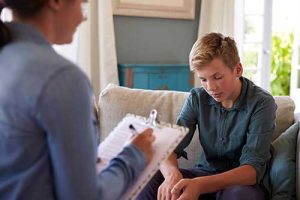
Family First Adolescent Services offers comprehensive treatment programs that address the effects of childhood trauma. Adolescence is complex and confusing, and trauma only complicates things further. With a staff-to-client ratio of 3:1, teens at our center receive attention, compassion, and expertise in helping them navigate their mental health. Call 888.904.5947 to learn more about our adolescent mental health treatment programs.
Understanding Reactive Attachment Disorder
Childhood trauma often stems from—and is influenced by—the family unit. RAD is a rare and complex condition that typically occurs in children who experienced abuse or neglect. A child who grew up around multiple caretakers, especially when those caretakers departed after a major emotional connection was developed, may also develop RAD.
RAD develops in childhood, but the effects can last a lifetime. During adolescence, RAD can cause difficulties in forming attachments and relationships, emotional instability, and trouble controlling impulses. These behaviors can be challenging for both the teen and their family to manage without professional guidance.
Symptoms of Reactive Attachment Disorder in Teens
Signs of RAD can range from mild to severe, but all stem from trouble building and maintaining relationships. Some of the most common signs include:
- Withdrawal and detachment from others, even family members
- A lack of positive emotions or interest in activities
- Difficulty expressing needs or wants
- Irritability, anger, and impulsivity
- Displaying inappropriate behavior for their age
It’s important to note that these signs could be related to a number of different mental health challenges. An assessment of the teen’s history and behavior is necessary to properly diagnose RAD.
Our Approach to RAD Treatment
Our dedicated team of professionals provides personalized treatment plans for adolescents with RAD. We combine various therapeutic approaches, ensuring a comprehensive treatment plan that addresses your teen’s unique needs. Families also receive support to build a safer, more compassionate home environment for their teen.
Reactive Attachment Disorder Treatment for Adolescents
Individual therapy is a key component of our treatment approach for RAD. During one-on-one sessions, teens can explore their feelings and experiences in a safe and confidential space, building trust with their therapist. Group therapy, experiences, and outings help build social skills and promote healthy relationships.
Our educational program helps bridge any gaps in their learning and provides them with the tools to manage symptoms that may arise from RAD. Teens can learn coping skills, emotional regulation techniques, and how to build healthy attachments.
Help for Families
Family involvement is essential in the treatment of RAD. Our dedicated team provides families with education and therapeutic support to help them navigate the challenges that come with raising a teen with RAD. We aim to build stronger, healthier family dynamics and promote healing for everyone involved.
Resources for Referring Professionals
We value collaboration and communication, and we are committed to working closely with referring professionals to ensure continuity of care for the teen. Our team provides regular updates and progress reports to keep everyone informed about the teen’s journey toward healing.
Frequently Asked Questions
What Is the Best Treatment for Reactive Attachment Disorder?
There is no standard RAD treatment plan, but effective strategies work with parents and adolescents to help them develop healthy attachments. This might involve talk and behavioral therapy in individual and family settings for teens, and parenting skills, education, and support groups for parents and caregivers. Since it often stems from neglectful, abusive, or absent caregiver relationships, teens with reactive attachment disorder have to learn how to trust and form healthy attachments with their parents or caregivers.
Is Medication Used for RAD Treatment?
Not usually. Treatments for RAD usually involve talk and behavioral therapies in addition to parental education and support. However, mental health conditions that co-occur with reactive attachment disorder may be safely and effectively treated with medication. ADHD, anxiety, depression, and trauma-related disorders can all co-occur with RAD in teens.
Does RAD Go Away?
RAD is typically a childhood disorder that often improves into adolescence and adulthood. But teens and adults can still struggle with lingering symptoms of reactive attachment disorder and the challenges it causes. Without RAD therapy to teach someone how to have healthy attachments and relationships with other people, challenges may persist.
What Are the Long-Term Effects of RAD?
Teens and adults with reactive attachment disorder often have challenges in their relationships with others. They may have issues with control, anger, expressing emotions and affection, self-esteem, and impulsivity.
Call Family First Adolescent Services to Get Help Now
If you’re concerned that your teen may be struggling with RAD, don’t hesitate to reach out for help. Our team at Family First Adolescent Services is dedicated to providing professional, compassionate treatment for teens and their families. We offer teen mental health programs for boys 12-18 at our residential center and a co-ed day program for the same age group in South Florida. Contact us online or at 888.904.5947 today and start the journey toward healing. Let us help your teen build a brighter future.
